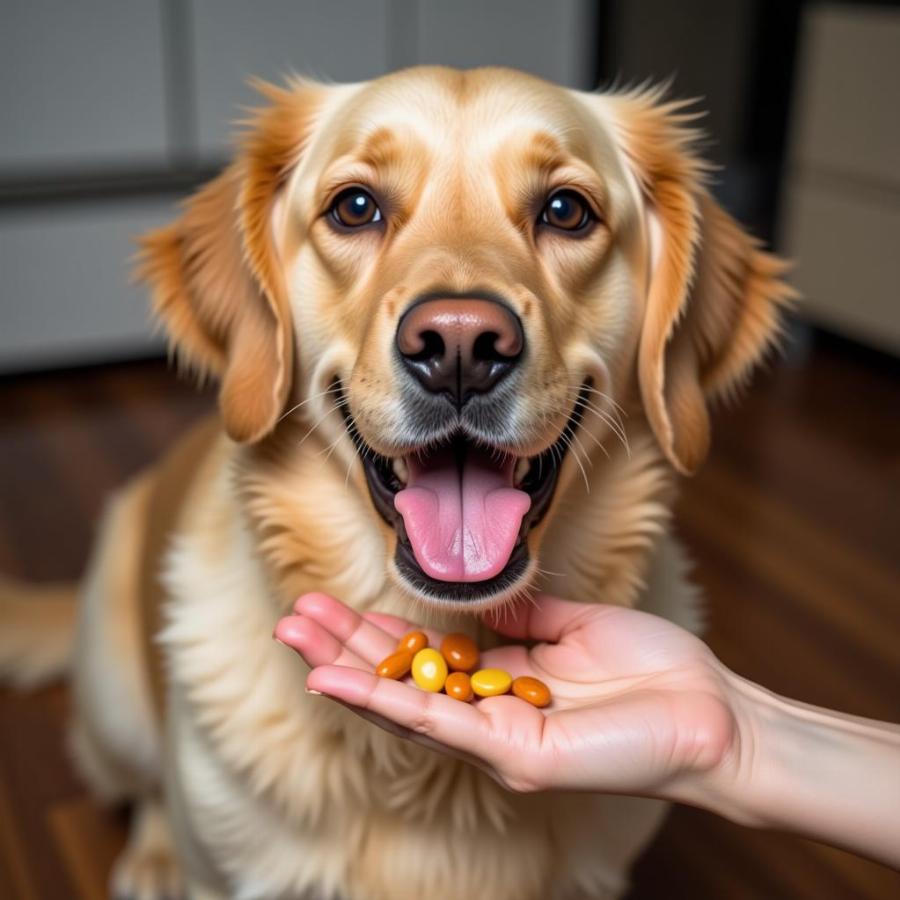The world of dog supplements can feel like a maze, especially when you’re bombarded with products promising to be the “missing link” to your furry friend’s health. But how do you know which supplement is truly beneficial and which is just clever marketing? Understanding what to look for, the science behind the ingredients, and your dog’s individual needs is key to making informed decisions. This article dives deep into the world of “missing link” dog supplements, equipping you with the knowledge to make the best choice for your canine companion.
Deciphering the “Missing Link”
The term “missing link” in dog supplements often refers to nutrients that may be lacking in commercial pet foods. However, it’s important to remember that every dog is unique.
- Diet Variation: A dog eating a raw food diet will have different nutritional needs than a dog consuming kibble.
- Life Stage: Puppies, adults, seniors, and pregnant or nursing dogs all require varying nutrient profiles.
- Health Conditions: Dogs with allergies, digestive issues, or other medical concerns may benefit from specific supplements.
Therefore, what constitutes a “missing link” varies greatly.
Common Ingredients and Their Benefits
Let’s explore some common ingredients found in “missing link” dog supplements and their purported benefits:
- Omega-3 Fatty Acids: Found in fish oil, these are known for promoting healthy skin and coat, supporting joint health, and potentially reducing inflammation.
- Glucosamine and Chondroitin: Often included for joint support, particularly in older dogs or those prone to hip and elbow dysplasia.
- Probiotics: Beneficial bacteria that can aid digestion, boost the immune system, and promote gut health.
- Antioxidants: Such as vitamins C and E, selenium, and beta-carotene, which help protect cells from damage caused by free radicals.
Evaluating a “Missing Link” Supplement
Before you add any supplement to your dog’s diet, it’s crucial to consult with your veterinarian. They can help you determine if a supplement is necessary and recommend appropriate options based on your dog’s individual needs.
When evaluating a “missing link” supplement, consider the following:
- Quality of Ingredients: Look for supplements with high-quality, bioavailable ingredients sourced from reputable suppliers.
- Manufacturing Practices: Choose products manufactured in facilities that adhere to strict quality and safety standards.
- Dosage and Administration: Follow the instructions provided on the product label and consult your vet for guidance on appropriate dosage for your dog’s size and weight.
Beyond Supplements: A Holistic Approach
While supplements can play a role in supporting your dog’s health, they should not be considered a replacement for a balanced diet, regular exercise, and routine veterinary care.
- High-Quality Food: Provide a complete and balanced diet that meets your dog’s nutritional needs.
- Regular Exercise: Engage your dog in physical activity suitable for their age and breed to maintain a healthy weight and support joint health.
- Preventative Care: Schedule regular checkups with your veterinarian to detect and address any health issues early on.
FAQs About Missing Link Dog Supplements
Q: Can I give my dog human supplements?
A: It’s not recommended to give your dog human supplements without consulting your veterinarian. Human supplements may contain ingredients that are toxic to dogs or in dosages that are unsafe.
Q: How long does it take to see results from a dog supplement?
A: The time it takes to see results can vary depending on the supplement, the dog’s individual needs, and the specific health condition being addressed. Some improvements, such as changes in coat and skin health, may be noticeable within a few weeks, while others, like joint support, may take several weeks or months.
Q: Are there any potential side effects of dog supplements?
A: While generally safe when used as directed, some dogs may experience side effects such as digestive upset (diarrhea or vomiting), allergic reactions, or interactions with medications. It’s essential to start with a low dose, monitor your dog closely, and consult your veterinarian if you notice any adverse reactions.
 Dog Taking a Supplement
Dog Taking a Supplement
The Importance of Informed Decisions
Navigating the world of “missing link” dog supplements doesn’t have to be overwhelming. By understanding your dog’s unique needs, researching ingredients, and consulting with your veterinarian, you can make informed choices to support your furry friend’s overall health and well-being.
Looking for More Expert Advice on Dog Care?
For further guidance on choosing the right supplements, understanding your dog’s nutritional needs, and accessing a wealth of information on all aspects of canine care, visit Beaut Dogs at https://beautdogs.com. Beaut Dogs is your trusted resource for expert advice and insightful content to help you provide the best possible life for your beloved companion. When you need personalized support, reach out to our team at [email protected] for detailed and accurate answers to all your dog-related questions. We’re here to help you navigate the wonderful world of dog ownership with confidence and joy.